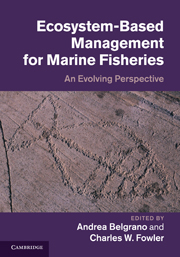Book contents
- Frontmatter
- Contents
- List of contributors
- Foreword
- Acknowledgments for cover artwork
- Introduction
- PART I CURRENT FORMS OF MANAGEMENT
- PART II ELEMENTS OF IMPORTANCE TO MANAGEMENT
- 5 Unintended consequences sneak in the back door: making wise use of regulations in fisheries management
- 6 Population dynamic theory as an essential tool for models in fisheries
- 7 Recovery of former fish productivity: philopatric behaviors put depleted stocks in an unforeseen deadlock
- 8 Boundary shifts: from management to engagement in complexities of ecosystems and social contexts
- 9 Civil society and ecosystem-based fisheries management: traditional roles and future opportunities
- PART III USING PATTERNS
- Afterword
- Index
- Plate section
9 - Civil society and ecosystem-based fisheries management: traditional roles and future opportunities
from PART II - ELEMENTS OF IMPORTANCE TO MANAGEMENT
Published online by Cambridge University Press: 17 February 2011
- Frontmatter
- Contents
- List of contributors
- Foreword
- Acknowledgments for cover artwork
- Introduction
- PART I CURRENT FORMS OF MANAGEMENT
- PART II ELEMENTS OF IMPORTANCE TO MANAGEMENT
- 5 Unintended consequences sneak in the back door: making wise use of regulations in fisheries management
- 6 Population dynamic theory as an essential tool for models in fisheries
- 7 Recovery of former fish productivity: philopatric behaviors put depleted stocks in an unforeseen deadlock
- 8 Boundary shifts: from management to engagement in complexities of ecosystems and social contexts
- 9 Civil society and ecosystem-based fisheries management: traditional roles and future opportunities
- PART III USING PATTERNS
- Afterword
- Index
- Plate section
Summary
Abstract
Fisheries management continues to improve and expand in scope, but increasingly governments cannot handle these management burdens alone. Governance with roots outside government, i.e., in civil society and in the private sector, can complement government-based fisheries management. Conservation or environmental non-governmental organizations (NGOs) are taking on increasing roles in this regard, including (1) raising public awareness, practicing advocacy, and pushing for policy reform; (2) setting priorities at regional or global scales; (3) performing monitoring, surveillance, and acting as watchdogs and whistleblowers; (4) bridging the chasm between science and management; (5) building capacity of local institutions to manage fisheries; (6) channeling additional financial resources to fisheries and broader ecosystem management; and (7) creating demonstration models of ecosystem-based management for fisheries (EBMF), where all the above can come together.
Civil society and fisheries management
True ecosystem-based management for fisheries (EBMF) remains an elusive challenge. In the past, fisheries management was simpler and cheaper, though not particularly effective – as we have seen from the newest Food and Agriculture Organization reports putting fully 80% of global commercial fisheries at or over sustainable levels (FAO 2009). The recent movement towards more effective fisheries management embodied in ecosystem-based management has carried a price – more and better science is needed to evaluate threats and investigate ecosystem feedbacks, a wider array of management tools need to be applied, integration of management is becoming ever more complex, and aiming for compliance across much wider arrays of users means greater surveillance and enforcement costs.
- Type
- Chapter
- Information
- Ecosystem Based Management for Marine FisheriesAn Evolving Perspective, pp. 264 - 276Publisher: Cambridge University PressPrint publication year: 2011
- 2
- Cited by



